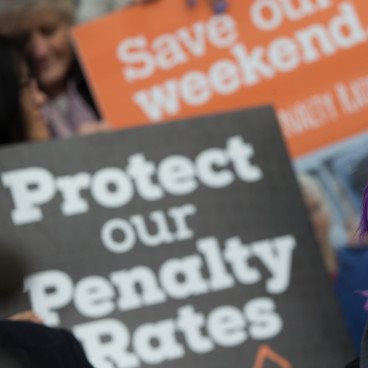Research from hospitality point of sale provider Impos has found penalty rates are the number one challenge affecting the hospitality industry, with restaurants, cafes, bars and pubs unanimous in highlighting it as the top issue that would impact business for the remainder of 2016.
Fifty-six percent of all hospitality businesses said penalty rates were the top challenge facing their business, while increased competition was the second biggest challenge and credit card/eftpos fees were the third biggest. Liquor licensing and high staff turnover were also key challenges.
Although all 434 hospitality owners, managers and employees, surveyed agreed penalty rates were the number one concern, the industry is divided about the best way to address the issue. Almost half of Restaurants (46 percent), and a third of Cafes (38 percent) and Bars / Pubs (31 percent) agree that penalty rates should be abolished completely, while approximately a quarter of all businesses would like to see Saturday and Sunday rates equalised.
Sean O’Meara, CEO of Impos said, “The issue of penalty rates is an important one for the hospitality industry, being a highly labour-intensive industry. In fact, IBISWorld said that wages will account for the second-largest share of revenue for cafes and coffee shops this year. Couple this with the fact that a major portion of sales in this industry are generated over the weekend, and you can start to understand the impact penalty rates have on hospitality businesses. It’s an urgent issue that the Government needs to address.”
Penalty rates have been a key election concern, with the Greens calling out Labor’s approach to the policy issue.
The Impos report also highlighted the growing influence of social media and the rapid pace technological change, with a 37 per cent of workers describing their place of work as ‘slow to adopt new technology’. Restaurants were more likely to be early adopters than cafes and bars/pubs.
All industry segments said using social media effectively was one of the top technological difficulties their business faces, followed by the expense of upgrading technology. Thirty-six per cent of restaurants said increased expectations around online and mobile bookings would be a key challenge in 2016.
“Technology is a fantastic tool for hospitality businesses, allowing them to improve customer service, boost business performance and create a competitive advantage. However, those business owners who lack the technical know-how or are afraid to embrace innovation can be very quickly left in the dust of the more tech-savvy. Just like in other industries, we are seeing a divide between those businesses with the digital capabilities and those without, highlighting the importance of investing in digital skills,” O’Meara said.

